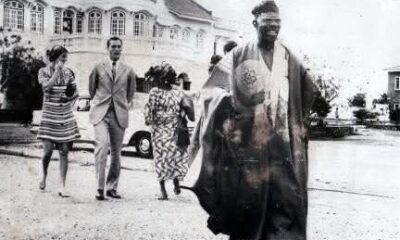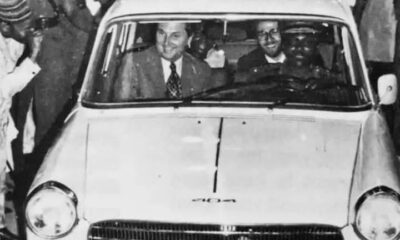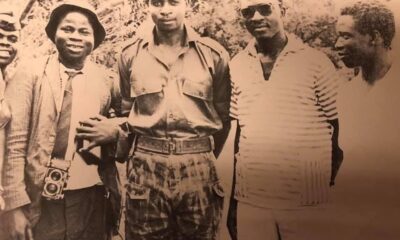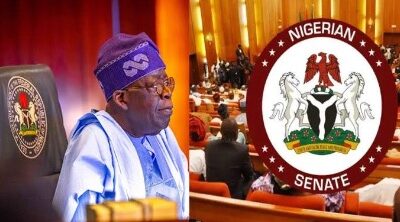Columns
Tribunal Orders Substituted Service: Lawyer To Post Restraint Notice At Multichoice Premises
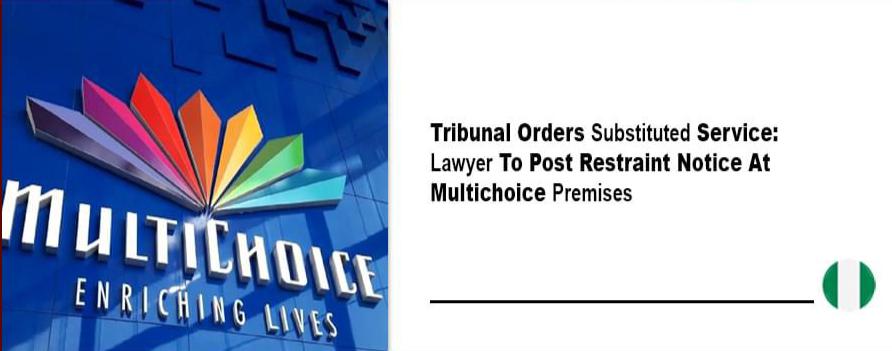
In a recent development regarding the impending tariff hike by MultiChoice Nigeria Limited on its DStv and Gotv packages, the Competition and Consumer Protection Tribunal in Abuja has mandated the posting of an interim order at MultiChoice offices across Nigeria.
This directive follows an ex parte motion filed by an Abuja-based lawyer, Festus Onifade, seeking to restrain MultiChoice from implementing the tariff increase scheduled for May 1.
Chairing the tribunal, Saratu Shafii issued the order dated April 29, instructing that the interim order restraining MultiChoice from increasing its tariffs be visibly displayed at the company’s corporate headquarters and all known branches across the nation.
Additionally, the order is to be communicated through MultiChoice’s email addresses, social media platforms, and other public communication channels.
Despite attempts to serve the company with the order, the Abuja office reportedly refused to accept the documents, prompting the tribunal to resort to substituted service.
The decision for substituted service, as per Section 48 of the Federal Competition and Consumer Protection Act, 2018, and CCPT Rule, 2021, entails posting the order at MultiChoice premises and communicating it through various channels.
MultiChoice had previously announced price increments, citing operational costs in Nigeria as the reason behind the decision.
.
#NewsUpdate #newstoday #nigeria #abujanigeria #lagosnigeria #johnugbe #Multichoice #MultiChoiceTalentFactory #MultiChoiceAfrica #DSTV #DStvStream #DStvPrem #DstvPremiership #GOTV #GOtvStream #tarrifhike #courtorder #competitionandconsumerprotectiontribunal #competitionandconsumerprotection
Columns
Chief Timothy Adeola Odutola (1902–1995): Pioneer Industrialist, Nationalist and Philanthropist of Ijebu-Ode
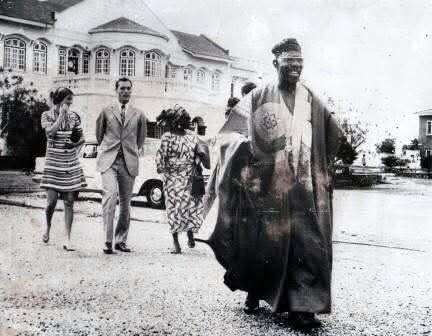
Chief Timothy Adeola Odutola was one of Nigeria’s foremost indigenous industrialists of the twentieth century, as well as a politician and philanthropist whose influence spanned commerce, nationalism, and education. Popularly known as the Ogbeni Oja of Ijebu-Ode, Odutola belonged to the pioneering generation of Nigerian entrepreneurs who laid the foundations for indigenous industrial capitalism during the colonial and early post-independence periods.
Early Life and Education
Timothy Adeola Odutola was born in 1902 in Ijebu-Ode, present-day Ogun State. He received his early education at St. Saviour’s Primary School, Italupe, and later attended Ijebu-Ode Grammar School, one of the earliest secondary schools in southwestern Nigeria. His education placed him among the emerging African elite prepared for clerical and administrative roles in the colonial system.
Early Career and Entry into Business
Odutola began his working life in the colonial service, a common pathway for educated Nigerians of his generation. However, he later resigned to pursue business independently. His early commercial ventures included trading in textiles (notably damask) and dried fish, commodities with strong local demand.
By the late 1920s and 1930s, Odutola had transitioned into the produce trade, becoming a licensed produce buyer. He invested heavily in storage facilities and transportation networks, enabling him to move agricultural products efficiently from rural areas to export points. This strategic integration helped him scale his operations rapidly.
Political Involvement and Nationalist Activities
Odutola was also politically active during the rise of Nigerian nationalism. In 1938, he served as Chairman of the Nigerian Youth Movement (NYM) in the Ijebu Division, aligning himself with one of the most influential nationalist organisations of the period.
In 1945, he represented Ijebu Province on the Legislative Council of Nigeria, the highest advisory body to the colonial government before independence. Three years later, in 1948, he was a member of the Nigerian delegation to the African Conference in London, reflecting his standing among Nigeria’s political and economic elite.
Industrial Empire and Business Achievements
By the time Nigeria attained independence in 1960, Odutola had built a large and diversified business conglomerate, making him one of the wealthiest indigenous businessmen of his era. His enterprises reportedly included:
Three industrial factories
Extensive retail and distribution franchises
A cattle ranch
A rubber and palm oil plantation covering about 5,000 acres
A sawmill
Export trading businesses
Gold exploration interests in the Ilesha area
Together with contemporaries such as Alhassan Dantata and Sir Louis Odumegwu Ojukwu, Odutola is widely regarded as part of the first generation of Nigerian industrialists who successfully competed with expatriate firms during late colonial rule.
Honours and Professional Leadership
In recognition of his contributions to commerce and public service, Odutola was awarded the Officer of the Order of the British Empire (OBE) in 1948. In the post-independence era, he became the first President of the Manufacturers Association of Nigeria (MAN), playing a central role in advocating for indigenous industrial development and protective economic policies.
Philanthropy and Legacy
Chief Odutola was also known for his extensive philanthropic activities. He funded the establishment of schools, built a church in Ijebu-Ode, and endowed professorial chairs at the University of Lagos and the University of Ibadan, contributing significantly to higher education in Nigeria.
His palatial residence, Onibudo House in Ijebu-Ode, became a symbol of indigenous wealth and success during the 1960s and 1970s and a gathering point for political and social elites.
Death and Historical Significance
Chief Timothy Adeola Odutola died in 1995, leaving behind a legacy that bridges commerce, nationalism, and philanthropy. He is remembered as a trailblazer of indigenous industrial enterprise and a key figure in Nigeria’s economic history.
Sources
Bim Babarinde Archives
Toyin Falola, Economic Reforms and Modernization in Nigeria
Manufacturers Association of Nigeria (MAN), historical records
Columns
General Yakubu Gowon and Nigeria’s First Locally Assembled Peugeot
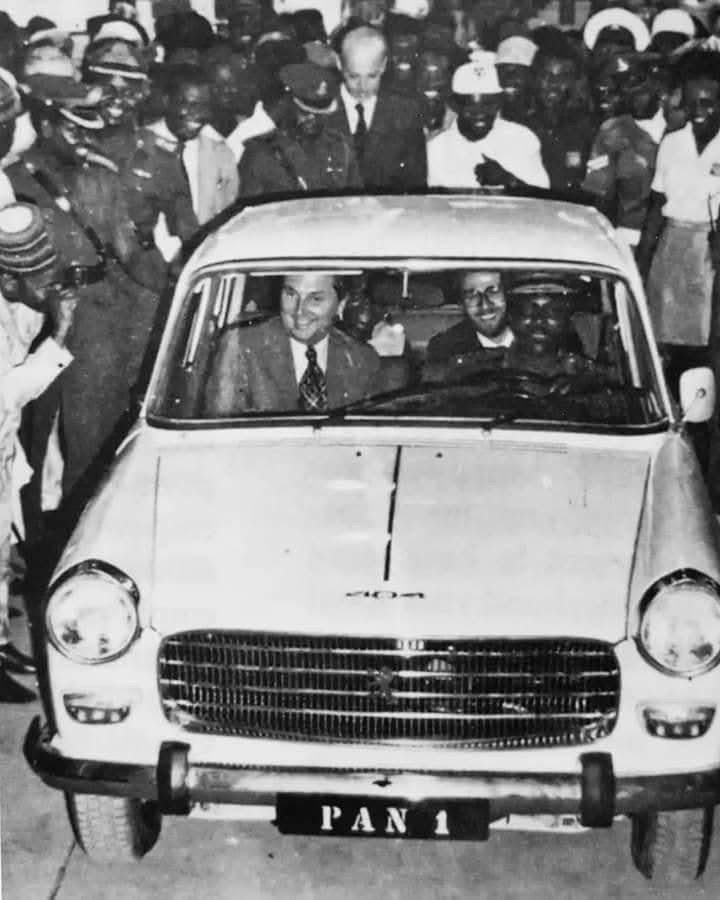
A Milestone in Nigerian Industrial History
In the mid-1970s, Nigeria took a significant step toward industrial self-reliance with the establishment of Peugeot Automobile Nigeria (PAN) in Kakuri, Kaduna. One of the most symbolic moments from this period was when Nigeria’s former Head of State, General Yakubu Gowon, personally test-drove the first vehicle assembled at the PAN plant, known as PAN 1, between 1974 and 1975. The event marked a defining chapter in Nigeria’s drive toward industrialisation and indigenous manufacturing.
Peugeot Automobile Nigeria (PAN), Kakuri
Peugeot Automobile Nigeria was established as a joint venture between the Federal Government of Nigeria, Peugeot of France, and Nigerian investors. The plant in Kakuri, Kaduna State, was designed to assemble passenger vehicles locally, reduce dependence on imported cars, create skilled employment, and stimulate technology transfer.
Kaduna was chosen due to its strategic location, existing industrial base, and proximity to rail and road networks, making it a hub for northern Nigeria’s manufacturing ambitions during the oil boom years.
The PAN 1 Test Drive
The photograph capturing General Yakubu Gowon test-driving PAN 1 holds both symbolic and practical significance. PAN 1 represents the first car assembled by Peugeot Automobile Nigeria, signifying the successful commencement of operations at the Kakuri plant.
General Gowon’s participation underscored:
The federal government’s strong political backing for industrial projects
The importance attached to local manufacturing during Nigeria’s post-war reconstruction era
Confidence in Nigeria’s ability to assemble modern automobiles to international standards
The test drive occurred during a transitional phase in Nigeria’s governance, shortly before Gowon was overthrown in July 1975, making the moment historically poignant.
Industrialisation and National Pride
During the 1970s, Nigeria pursued an ambitious industrialisation agenda, buoyed by oil revenues. PAN stood alongside other major industrial projects such as Ajaokuta Steel, Volkswagen of Nigeria (VON), and the cement factories spread across the country.
The PAN initiative:
Trained Nigerian engineers and technicians
Established local supply chains
Became a symbol of modernity and national pride
Peugeot vehicles assembled in Kaduna soon became common sights on Nigerian roads and were widely adopted by government agencies and private citizens alike.
Legacy of PAN
Peugeot Automobile Nigeria remained Nigeria’s leading automobile assembly company for decades and played a central role in shaping the country’s automotive culture. Although production levels fluctuated over time due to economic challenges, policy shifts, and import competition, PAN’s historical importance remains undisputed.
The image of General Gowon behind the wheel of PAN 1 continues to serve as a visual reminder of a period when Nigeria actively pursued industrial self-sufficiency with optimism and confidence.
The test drive of PAN 1 by General Yakubu Gowon was more than a ceremonial act—it represented Nigeria’s belief in its industrial future. The moment encapsulated the aspirations of a nation eager to build, assemble, and innovate locally. Today, it stands as an enduring symbol of Nigeria’s early automotive and manufacturing ambitions.
Source
Mohammed Tukur, Facebook Photos (archival image and caption)
Columns
Peter Obe and the Lens of History
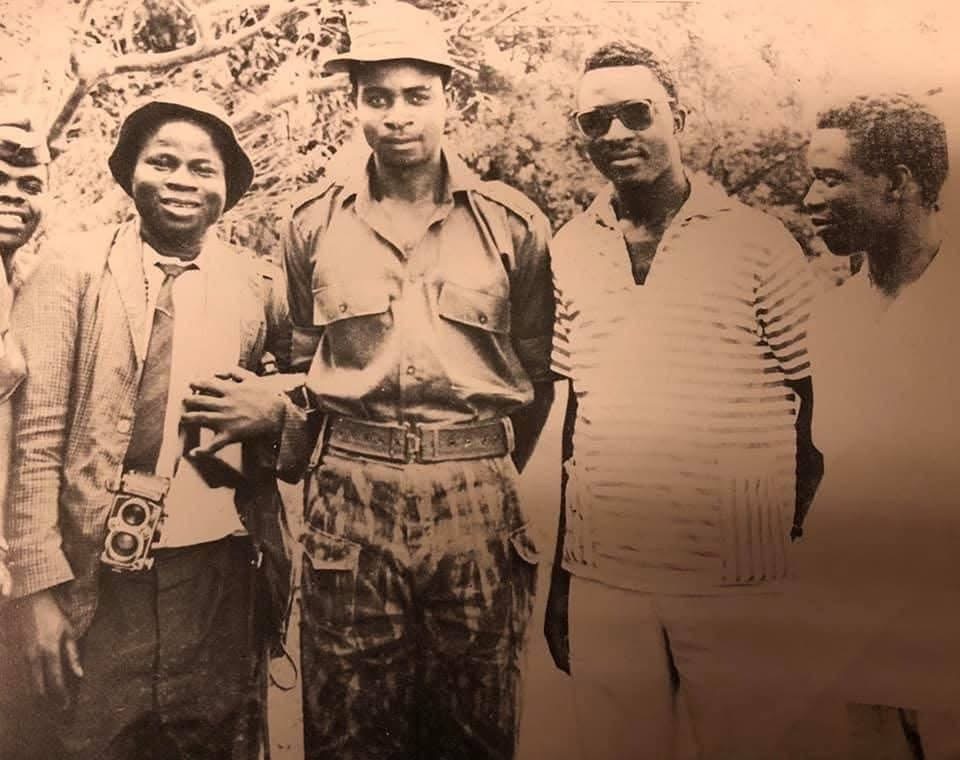
Nigerian Photojournalism, the Civil War, and a Visual Legacy
One of the most enduring visual records of the Nigerian Civil War is a photograph taken shortly after Federal troops captured Enugu in October 1967. In the image stands Peter Obe (1932–2013), one of Nigeria’s most accomplished photojournalists, alongside Lieutenant Colonel Theophilus Yakubu Danjuma and other military officers. Beyond its immediate wartime significance, the photograph symbolises the power of photography in documenting Nigeria’s most turbulent moments and preserving them for posterity.
Peter Obe: A Pioneer of Nigerian Photojournalism
Peter Obe was among the finest photographers Nigeria produced in the twentieth century. He served for many years as Chief Photographer of the Daily Times of Nigeria, then the most influential newspaper in the country. In this role, Obe documented political leaders, military campaigns, social life, and historic national events during Nigeria’s formative decades.
In addition to his work with Daily Times, Obe undertook freelance assignments for Agence France-Presse (AFP), giving his work international reach. Later, he established his own photography studio in Surulere, Lagos, a creative hub for Nigerian media professionals during the post-independence era.
The Photograph: Enugu, October 1967
The photograph featuring Peter Obe with Lt. Col. T. Y. Danjuma was taken shortly after Federal forces captured Enugu, the capital of the secessionist Eastern Region, during the Nigerian Civil War (1967–1970). The fall of Enugu marked a significant turning point in the conflict, symbolising the collapse of Biafra’s early administrative structure.
As a frontline photojournalist, Obe risked his life to document military operations, providing visual evidence of events that shaped Nigeria’s history. His work from this period remains an essential archival resource for historians studying the war.
Nigerian Photography Before and After Peter Obe
Nigerian photography predates independence by over a century. In 1859, George Da Costa established the first known portrait photography studio in Lagos, laying the foundation for indigenous photographic practice. From this early beginning emerged a lineage of photographers who shaped Nigeria’s visual culture.
Notable figures include:
Jonathan Adagogo Green of Bonny
H. Sanya Freeman
Solomon Alonge of Benin
Matthew Faji
J. D. ‘Okhai’ Ojeikere, famed for his hairstyles series
Yusuf Oladele
Jackie Phillips
Sunmi Smart-Cole
Gani Layiwola
Cornelius Oyemade
Baba Shettima
In the later twentieth and early twenty-first centuries, photographers such as Don Barber, Jide Adeniyi-Jones, and Tam Fiofori continued this tradition, blending documentary realism with artistic expression.
Peter Obe stands prominently within this continuum, bridging early post-colonial photography and modern Nigerian photojournalism.
Publication and Archival Value
Many of Peter Obe’s most important images, including the Enugu photograph, were compiled in his book:
Nigeria: A Decade of Crises in Pictures
This work remains a critical visual archive of Nigeria’s political instability, military rule, and civil conflict between the 1960s and 1970s. It is frequently cited by scholars, journalists, and curators documenting Nigeria’s modern history.
Legacy and Significance
Peter Obe’s contribution transcends aesthetics. His photographs:
Serve as primary historical evidence
Preserve moments that written records alone cannot capture
Help humanise political and military history
Through his lens, Nigerians can see their past clearly—unfiltered, immediate, and honest. His work helped establish photography as a respected tool of journalism and historical documentation in Nigeria.
The photograph of Peter Obe with Lt. Col. T. Y. Danjuma in post-capture Enugu is more than a wartime image; it is a testament to the courage of Nigerian photojournalists and the enduring value of visual history. Peter Obe’s legacy remains firmly etched into Nigeria’s collective memory, ensuring that critical moments of national crisis are neither forgotten nor distorted.
Sources
1. Obe, Peter. Nigeria: A Decade of Crises in Pictures. Lagos: Daily Times Publications, 1978.
2. Falola, Toyin. The History of Nigeria. Greenwood Press, 1999.
3. Madubuike, Uche. “Photojournalism and the Nigerian Civil War.” Journal of African Media Studies, Vol. 6, No. 2, 2014.
-
Business1 year ago
US court acquits Air Peace boss, slams Mayfield $4000 fine
-

 Trending1 year ago
Trending1 year agoNYA demands release of ‘abducted’ Imo chairman, preaches good governance
-

 Politics1 year ago
Politics1 year agoMexico’s new president causes concern just weeks before the US elections
-

 Politics1 year ago
Politics1 year agoPutin invites 20 world leaders
-

 Politics1 year ago
Politics1 year agoRussia bans imports of agro-products from Kazakhstan after refusal to join BRICS
-
Entertainment1 year ago
Bobrisky falls ill in police custody, rushed to hospital
-
Entertainment1 year ago
Bobrisky transferred from Immigration to FCID, spends night behind bars
-
Education1 year ago
GOVERNOR FUBARA APPOINTS COUNCIL MEMBERS FOR KEN SARO-WIWA POLYTECHNIC BORI

